Wine shopping can be an adventure, with countless labels vying for your attention on store shelves.
But have you ever felt like those bottles are silently judging your choices? Some wine labels go beyond clever marketing, offering a cheeky commentary on your drinking habits.
These witty wine labels might make you laugh, cringe, or even reconsider your selection. From brutal honesty about your wine consumption to sassy remarks about your social life, these labels aren’t afraid to call you out.
Whether you’re browsing for a casual weeknight drink or selecting a bottle for a special occasion, prepare to face some playful judgment from these sassy wine labels.
1) “You seem stressed, are you sure now’s a good time for wine?” – The Philosopher’s Bottle
Wine labels might just be the new life coaches.
The Philosopher’s Bottle, for example, will question your every move.
Picture this: You’ve had a long day at work, and you’re ready to unwind with a glass of wine.
As you reach for that bottle of Philosopher’s Blend, you catch a glimpse of the label.
There it is, staring back at you with judgment in its inky eyes. “You seem stressed, are you sure now’s a good time for wine?” it asks, channeling your mother’s disapproving tone.
You can almost hear the label’s voice, dripping with concern and a hint of condescension.
It’s as if the wine bottle has suddenly become your personal life coach, questioning your choices.
You might find yourself defending your decision to the inanimate object. “Of course it’s a good time for wine,” you mutter, feeling slightly ridiculous.
As you pour that glass, you can’t shake the feeling that the bottle is silently judging your every move.
It’s like having a tiny, grape-flavored therapist perched on your kitchen counter.
Perhaps the Philosopher’s Bottle is onto something.
Maybe it’s trying to encourage mindful drinking.
Or maybe it’s just another way for wine labels to mess with your head.
2) “Pairs well with decisions you’ll regret by morning.” – Retro Grudge
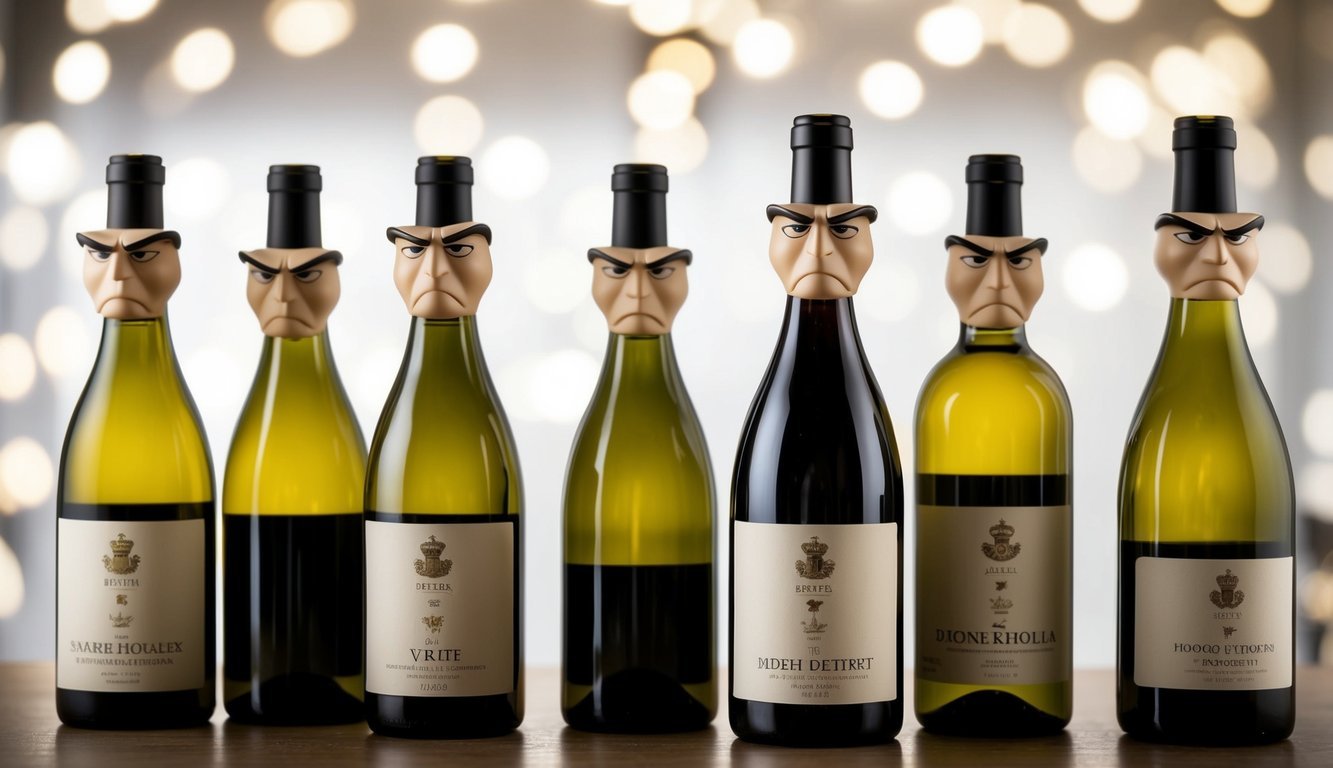
Retro Grudge wine knows you’re about to make some questionable choices.
This cheeky label isn’t afraid to call you out on your potential missteps.
As you reach for that bottle, it’s like the wine is giving you a knowing wink.
It’s saying, “Go ahead, pour another glass.
We both know where this is heading.”
The vintage humor of Retro Grudge might make you chuckle, but it’s also eerily accurate.
You’ll find yourself nodding along as you sip, thinking about those 2 AM texts you’re bound to send.
This wine doesn’t judge – it just tells it like it is.
It’s the perfect companion for nights when you’re feeling a bit rebellious and carefree.
So go ahead, embrace the spirit of Retro Grudge.
Just remember, future you might not be too thrilled with present you’s decisions.
But hey, that’s a problem for tomorrow, right?
3) “Just here to make the awkward silence louder.” – Chirpy Chardonnay
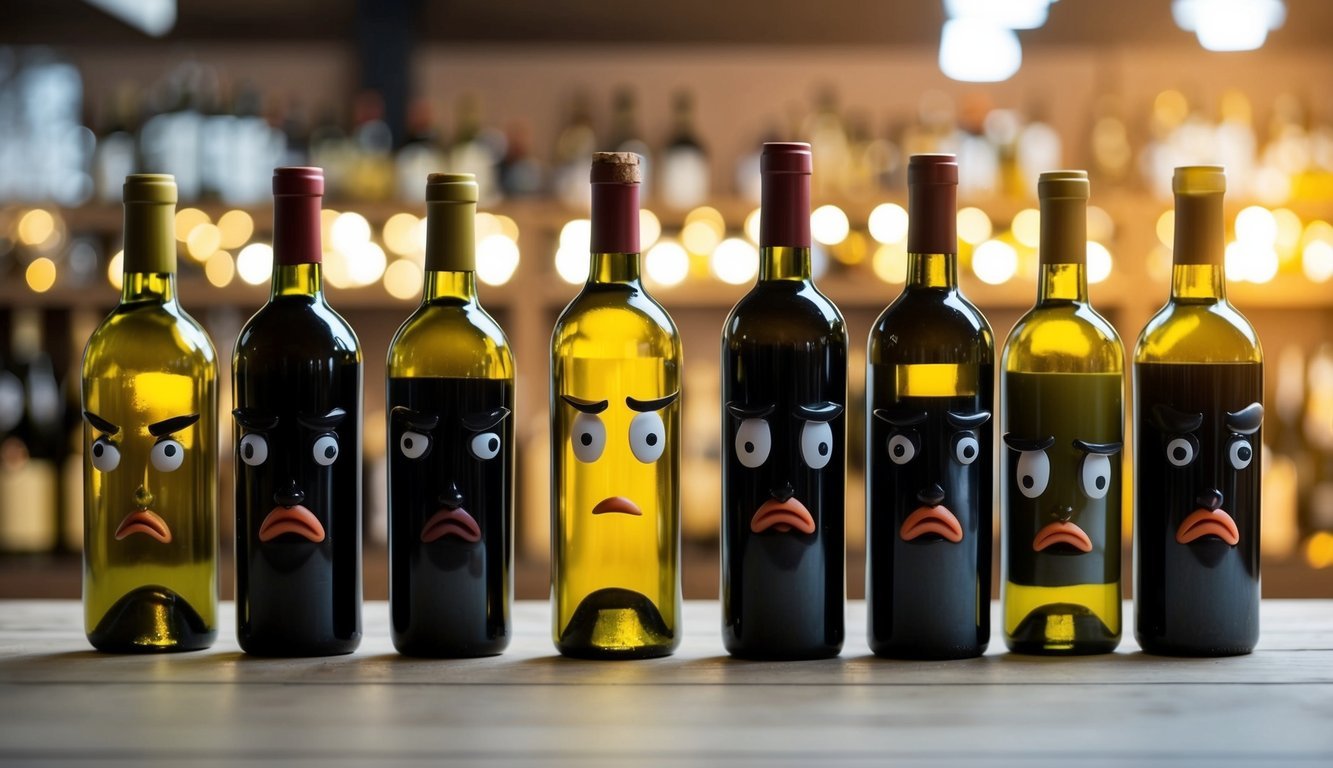
Ever felt like your wine is mocking you? Chirpy Chardonnay takes it to a whole new level.
This sassy label doesn’t shy away from calling out those uncomfortable moments at your dinner party.
You’ve invited guests over, hoping for stimulating conversation.
Instead, you’re met with deafening silence.
Enter Chirpy Chardonnay, your new partner in crime.
This wine label knows exactly what’s going on.
It’s not here to save the day or spark brilliant discussions.
Nope, it’s just here to amplify that awkwardness you’re feeling.
As you pour another glass, you can’t help but chuckle.
At least someone (or something) at the table has a sense of humor.
Maybe it’s time to embrace the quiet and let Chirpy Chardonnay do the talking.
Who knows? This witty label might just become the icebreaker you needed.
Your guests might find themselves bonding over the wine’s cheeky attitude.
And if not, well, at least you’ll have a drinking buddy who understands your pain.
4) “Not your mom, but still silently judging.” – Vintage Critic
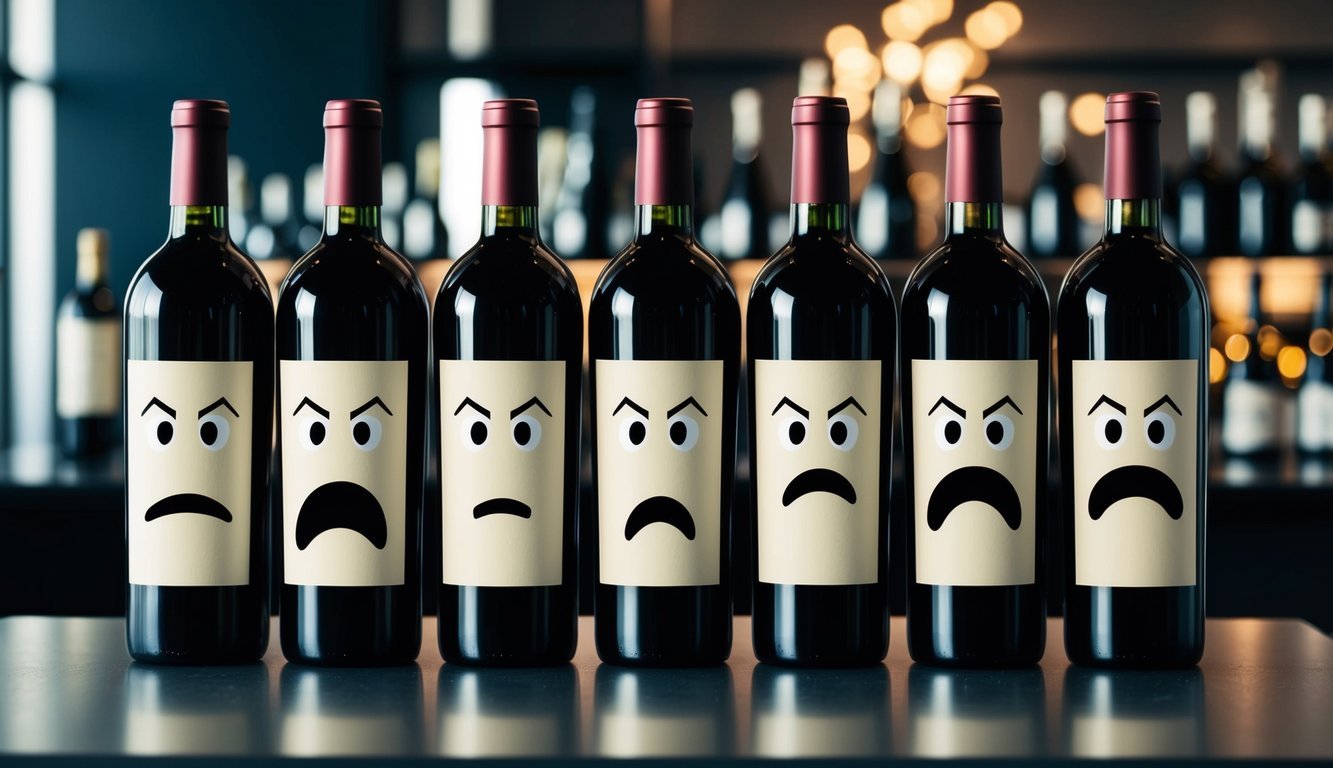
You might think you’ve escaped your mother’s judgmental gaze, but Vintage Critic is here to fill that void.
This wine label takes a cheeky approach to critiquing your choices.
With its minimalist design and serif font, Vintage Critic exudes an air of sophistication.
The label features a simple illustration of a raised eyebrow, perfectly capturing that look of silent disapproval.
As you pour a glass, you can almost hear the unspoken comments. “Really? That’s what you’re wearing?” or “Interesting career choice, dear.” It’s like having a disapproving relative at your dinner table.
But don’t let Vintage Critic intimidate you.
Embrace the humor and pour yourself another glass.
After all, you’re an adult now, and you can handle a little silent judgment with your Merlot.
Just remember, unlike your mother, this critic can’t call you the next day to remind you of your shortcomings.
Cheers to that!
5) “For those who can’t handle a judgmental mother but still love the critique.” – Picky Pinot
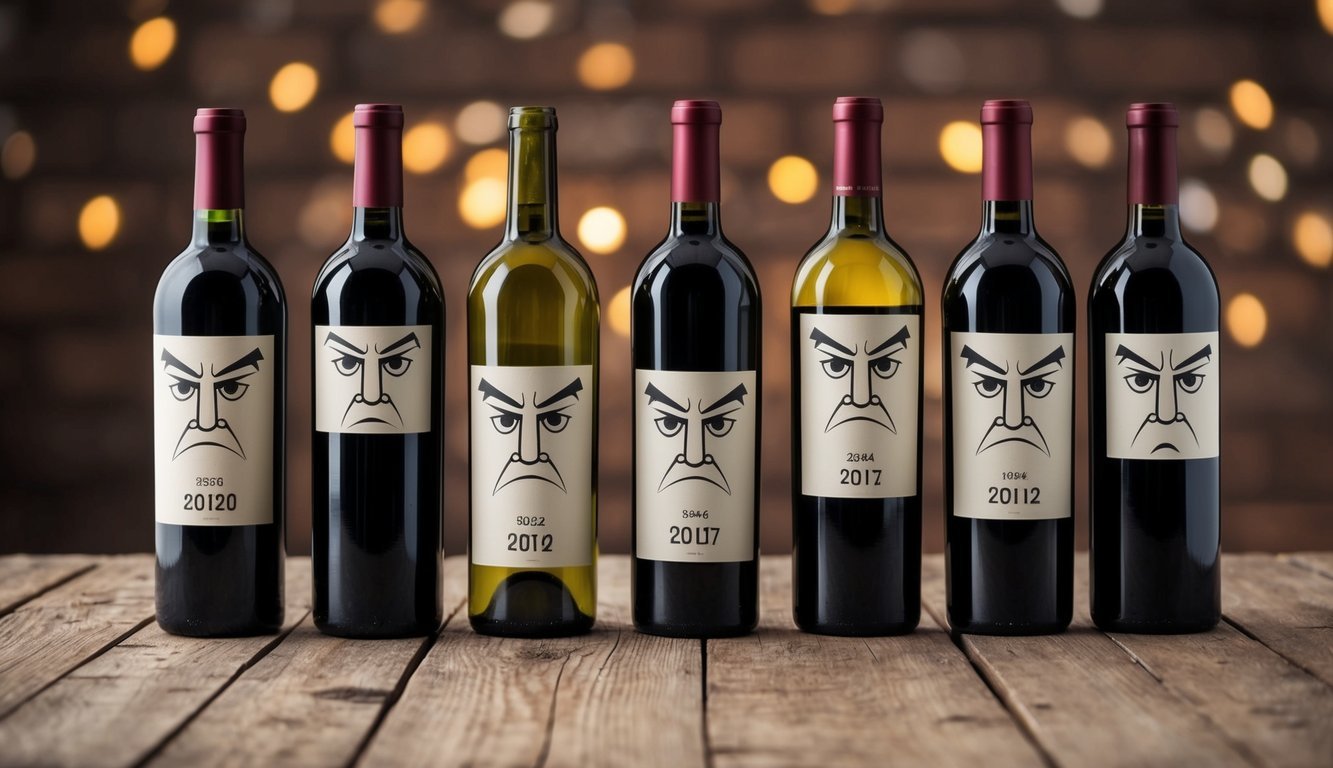
You know you’re in for a treat when you spot this label.
Picky Pinot delivers a playful jab at your wine choices without the emotional baggage.
This cheeky wine embraces your love for critique while sparing you the familial drama.
It’s perfect for those nights when you crave a bit of sass with your glass.
Picky Pinot doesn’t hold back.
Each sip reminds you of your questionable life choices, but in a way that makes you chuckle rather than cringe.
The label features a cartoon sommelier with a raised eyebrow, silently judging your pairing decisions.
It’s like having a personal wine critic right at your dinner table.
You’ll find yourself reaching for Picky Pinot when you want to indulge in self-deprecating humor.
It’s the ideal companion for a night of Netflix and mild self-reflection.
6) “Ever considered therapy instead?” – Introspective Merlot
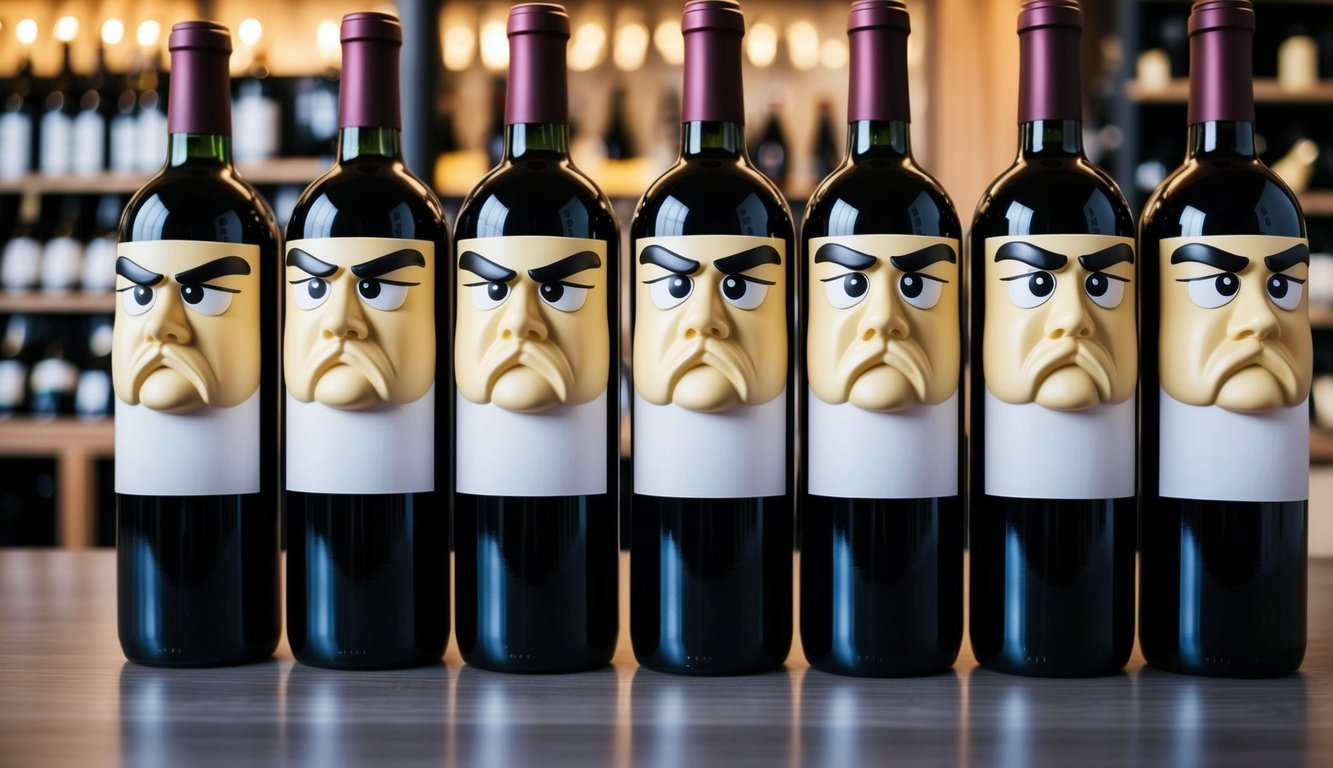
The Introspective Merlot is more than just a bottle of wine.
It’s like a friend who’s worried about your late-night drinking habits.
This wine label knows you’re not just here for a casual drink.
It senses you’re trying to drown your sorrows in a bottle of red.
The Introspective Merlot doesn’t judge, but it does care about your well-being.
It gently suggests that maybe talking to a professional might be more helpful than this late-night wine session.
You can almost hear the label whispering, “It’s okay to need help.
We all do sometimes.” As you pour another glass, you start to wonder if the wine’s onto something.
The rich, velvety taste of the Merlot reminds you that life has its ups and downs.
But perhaps it’s time to face your challenges head-on, rather than at the bottom of a bottle.
Understanding Wine Labeling
Wine labels convey crucial information about what’s inside the bottle.
They combine legal requirements, marketing elements, and design to inform and attract consumers.
History of Wine Labels
Wine labels originated in the 1700s as simple identifiers.
Early versions were handwritten tags attached to bottles.
As glass-making improved, labels became more elaborate.
By the 19th century, printed paper labels emerged.
They featured intricate designs and detailed information about the wine’s origin and producer.
Today’s labels must meet strict regulations.
They display essential details like alcohol content, vintage, and appellation.
Modern labels also serve as powerful branding tools.
Significance of Design and Imagery
Wine label designs can significantly influence your purchasing decisions.
Eye-catching imagery and clever names often grab your attention on crowded shelves.
Some labels use humor or provocative images to stand out.
Others opt for classic, elegant designs to convey quality and tradition.
Color choices play a role too.
Reds often feature dark, rich tones, while whites use lighter, fresher palettes.
Imagery can hint at flavor profiles or evoke emotions.
A label with a sun-drenched vineyard might suggest ripe, fruity notes.
Ultimately, the label’s design aims to reflect the wine’s personality and appeal to your tastes and preferences.
Psychology Behind Wine Labels
Wine labels play a crucial role in shaping consumer perceptions and influencing purchasing decisions.
The design, color, and information presented on a label can significantly impact how you view the quality and value of a wine.
Consumer Perceptions
Wine labels serve as powerful indicators of what you can expect from the bottle.
The visual elements and text on a label can create strong associations in your mind.
A well-designed label might make you perceive the wine as more sophisticated or premium.
Colors used on labels can evoke specific emotions or expectations about the wine’s flavor profile.
For example, gold accents might suggest luxury, while earthy tones could hint at a more rustic wine.
The information provided, such as tasting notes or vineyard details, can shape your expectations before you even taste the wine.
This can actually influence your perception of the flavor once you do try it.
Label Influence on Buying Decisions
When shopping for wine, you often make split-second decisions based on the label.
An eye-catching or unique design is more likely to grab your attention on a crowded shelf.
Labels that align with your personal style or values can make you more inclined to choose that bottle.
For instance, if environmental issues are important to you, you might be drawn to labels featuring sustainable practices.
The perceived value of a wine is closely tied to its label design.
You might assume a bottle with a more elaborate or sophisticated label is of higher quality, even if that’s not necessarily the case.
Wine brands use this psychology to their advantage, especially for lower-end wines where taste differences may be subtle.
In these cases, the label becomes a key differentiator in your purchasing decision.

